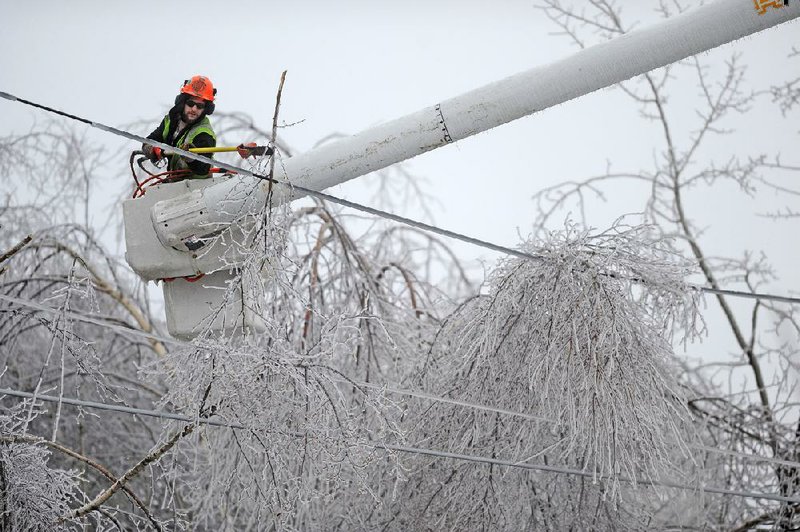Repair crews worked around the clock Christmas Eve to restore power lost after a weekend ice storm, but thousands - from Maine to Michigan and into Canada - prepared for a holiday at home without electricity or packed up their wrapped gifts and headed off to stay with family or friends.
The National Weather Service said more snow was expected to move into the Northern High Plains and Central Rockies on Tuesday before rolling into the Great Lakes and Midwest by this morning.
The nationwide death toll from the storm reached at least 14 on Tuesday when a 50-year-old man in Knox, Maine, was overcome by carbon monoxide fumes from a generator. It was the second reported death attributed to fumes from a generator during the storm. Police in Michigan also attributed two deaths in a traffic collision that happened Monday to the storm.
The number of customers in Maine without power spiked to more than 100,000 Tuesday, even as Central Maine Power Co. sent more than 1,000 workers to help restore power throughout the state. The company’s goal was to restore power for all customers by Thursday night, while other utilities in Maine warned customers they could be without electricity until Friday.
Across the border in Canada, Toronto officials said90,000 customers were still without power Tuesday. While that was down from 300,000 people at the height of the weekend power failures, some were likely to be in the dark until after Christmas.
That was the case, too, in Michigan, where Jackson-based Consumers Energy - the state’s largest utility - said it hadn’t had this many power failures during any Christmas week since its founding 126 years ago. Close to 17 percent of its 1.8 million electric customers lost power during the storm that hit late Saturday; roughly 157,000 remained without it Tuesday.
“We expect to see even more progress today as additional crews from 11 states and Washington, D.C., continue arriving in Michigan,” said Mary Palkovich, Consumers Energy’s vice president of energy delivery. “We thank the men and women working safely around the clock to recover from this catastrophic storm and our customers for their continued understanding and patience.”
Ken Fuller runs a generator repair shop in Lansing, Mich., where more than 13,000 people were without power Tuesday. He typically closes by noon on Christmas Eve, but at 12:30 p.m. he was cleaning out a broken generator’s carburetor - and had five more waiting to be serviced.
“The temperature outside is 15 to 20 degrees,” Fuller said. “Christmas is going to have to take second fiddle right now because houses are getting cold, freezing water pipes.”
That was the concern that John Potbury and his family of four faced outside Flint. They lost electricity at 6 a.m. Sunday and since then have been living in a single bedroom warmed by generator-powered space heaters.
Lights on the Christmas tree were dark, of course, but there was no power to the freezer, either. “Even though the house is freezing cold, the freezer items were starting to thaw out,” Potbury said.
That wasn’t the greatest concern, however, for his kids, 8-year-old Jacob and 5-yearold Jackson. Potbury said he told them Tuesday, “Santa runs on reindeer power, not electricity, so he should be OK.”
In Canada, five people were dead, likely from carbon monoxide poisoning, police said Tuesday.
Police commander Dacid Vijakainen warned residents to avoid using generators and charcoal or gas grills to heat their homes after a 52-year-old man and his 72-year-old mother died northeast of Toronto.
Police in Quebec said carbon monoxide poisoning is believed to be the cause of three deaths in a chalet on the province’s North Shore.
In Toronto on Monday night, 11 people were taken to hospitals with signs of carbon-monoxide poisoning. Mayor Rob Ford said the city received about six times as many calls about carbon monoxide Monday - about 110 over 24 hours - as it gets in a usual day.
Toronto issued an extreme cold weather alert, and temperatures were set to plunge to 6.8 degrees Fahrenheit on Tuesday night. The freezing conditions will last throughout the week, according to Environment Canada.
Information for this article was contributed by Charmaine Noronha of The Associated Press.
Front Section, Pages 4 on 12/25/2013
